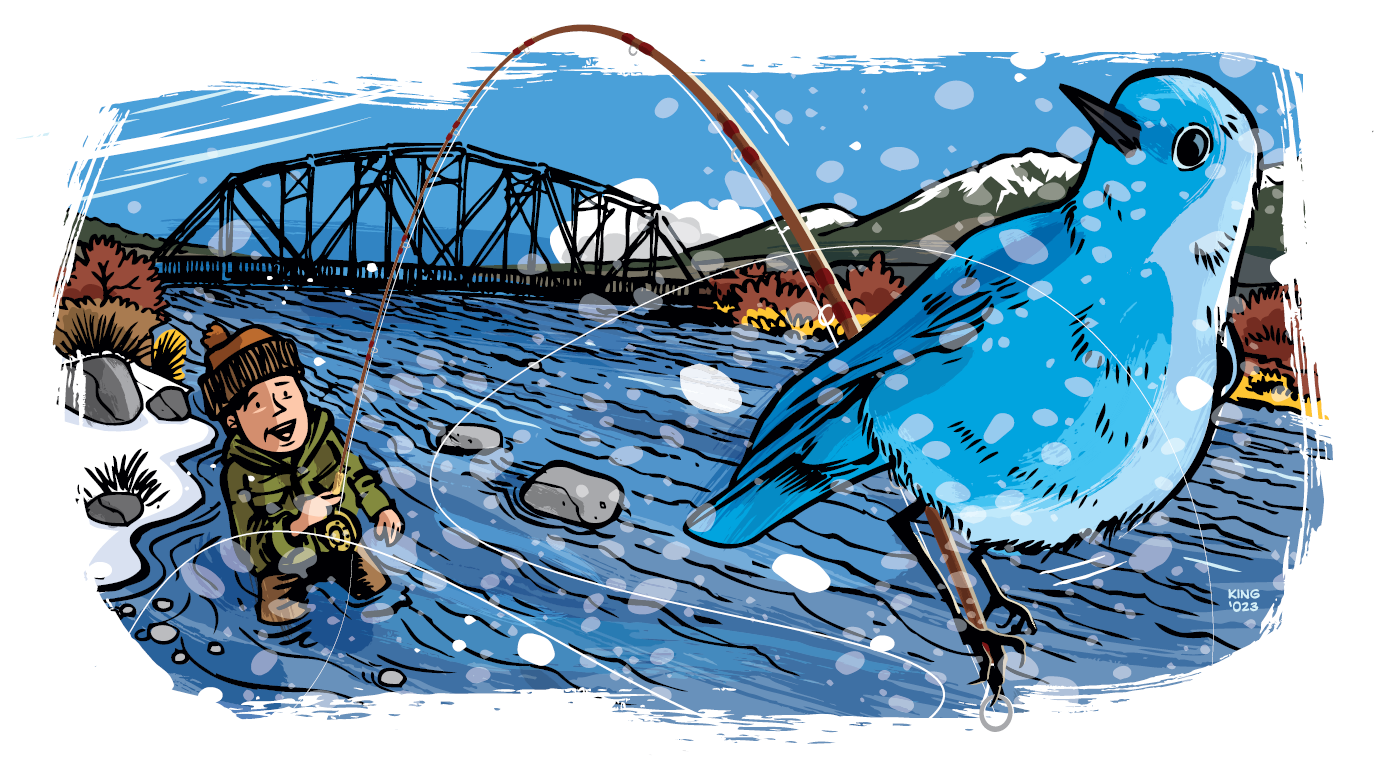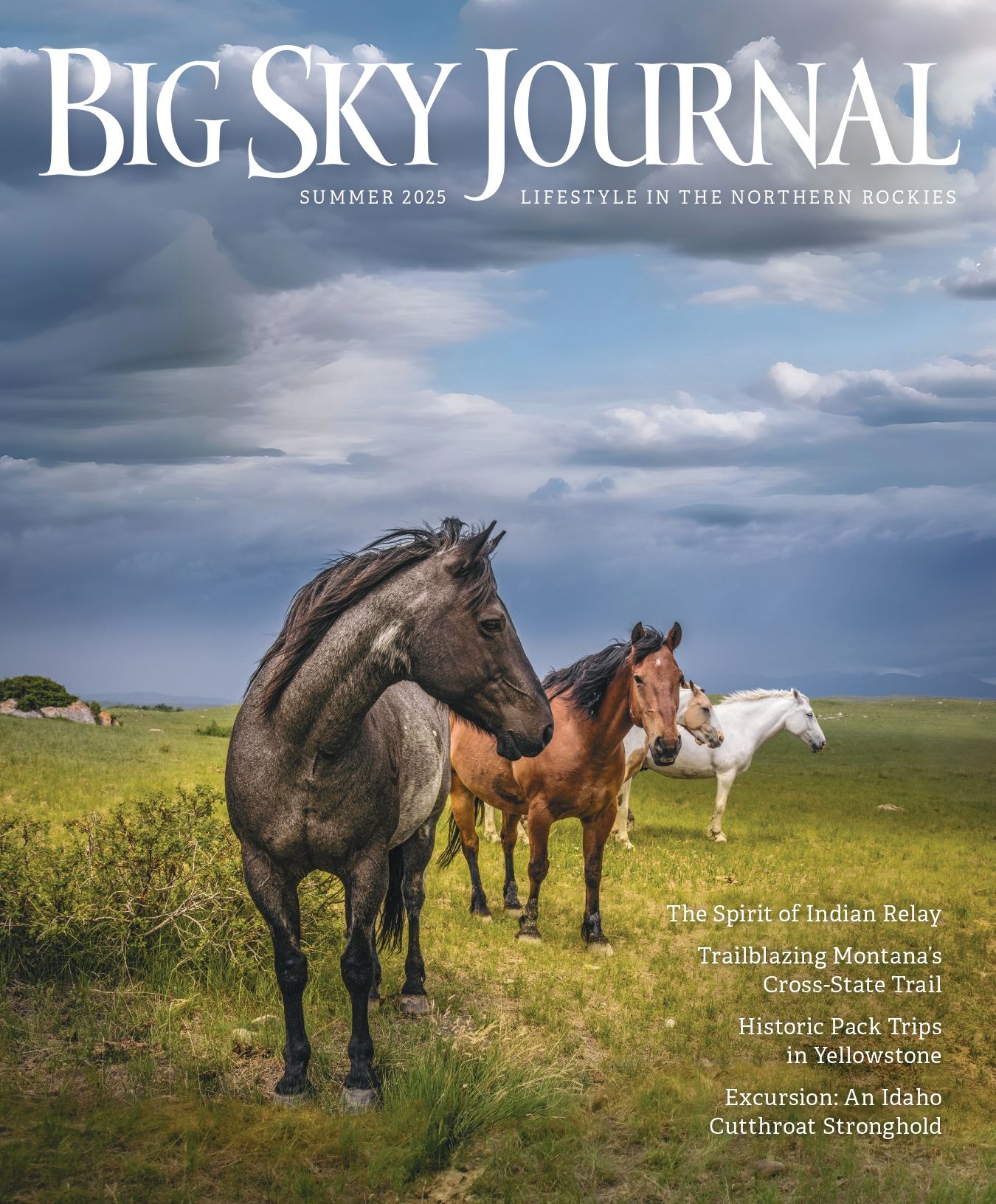
01 Feb Outside: Gone Fishin’
Madison bluebirds and other miracles
Listen to the river sing sweet songs,
To rock my soul.
— Grateful Dead
The ranger at the northeast entrance to Yellowstone National Park had been adamant: “Do NOT engage in any recreational activities.” Thus advised, my friend Jerry and I set off toward Lamar Valley, sworn to abstain from taking any pictures or admiring any bison, which makes about as much sense as me telling my 3-year-old granddaughter, Eddy Mae, to help me make a batch of chocolate chip cookies, but warning her, “Don’t you dare eat any cookie dough!” And that’s about how it went, all the way to West Yellowstone in light snow, Jerry and I not pausing to “recreate” in paradise.
This epic journey unfolded in late September 2013. Under sage political leadership, Congress had decided it distrusted the government so thoroughly that the prudent option was to shut it down. So, the first thing they did was close the only part of government most folks can agree they love: national parks. We were due at the Old Faithful Inn for the international Wild Trout Symposium, where I was to deliver a paper on teaching the literature and craft of fly fishing. The warnings, though, were ominous. As the October 1 budget deadline approached, all signs pointed to the conference being canceled unless Congress stumbled upon a come-to-Jesus moment. But Jesus had already left the fly shop.
Once in West Yellowstone, reality set in. The government had indeed been shelved indefinitely, the symposium had been postponed until the following fall, and we were left with a vexing dilemma: What should we do for the next few days? With no official work to do, and no passage into Yellowstone, we were forced into a dawn-to-dusk fishing opportunity outside of the park.
The weather forecast was iffy, but this time of year iffy is just about perfect. With any luck, and the right mix of cloudy, cool weather and light precipitation, armies of insects would be on the march. We set our sights on the Madison River below Quake Lake, where past fall fishing had been reliably productive and occasionally spectacular. The stars were aligning: weather, river, insects, relaxed head space — a perfect storm of piscatorial pleasure. But what unfolded for us over the next few days was not exactly a monster brown trout bonanza.
Surely, the weather must have had something to do with it. The sun decided to appear off and on, with intermittent periods of cold rain and spitting snow — a confusing enough mix of evocative warmth and bone-chilling damp that we encountered entomological schizophrenia. The bugs didn’t know what to do. There was so much flux that the fish couldn’t key in on any one weather trend. We changed flies, water depths, and the length of our leaders, tossing big ol’ woolly buggers when all else seemed hopeless. We caught a few, but far from the haul we had envisioned as the payoff from federal political paralysis.
They say the third time’s a charm, though, and we would test that adage on the third and final day at the fabled Three Dollar Bridge. It was snowing with conviction that morning: the Madison in mid-fall, the stuff legends are made of. Jerry trudged downstream to do battle, while I slogged upstream along the far bank to some familiar pocket water, the path slick with snow, every step an adventure. Still, as an addict of “the next day” and “the next cast,” I was undaunted. I was gonna crush this.
As it turned out, I was the crushee. In the biting cold and relentless wind, my glasses kept fogging. Molecules of the Madison froze in the guides. My fingerless gloves cried out for completion.
Seeing scant surface action, I nymphed. After countless fly changes and adding tippet with fingertips that refused to bend, I was approaching a combination of desperation and hypothermia. But — and this is the salvation of fly casting, particularly nymphing — I also was nearing a frozen Zen state that comes with the hypnotic rhythm of a single cast, a mend, a drift, the pick-up, and a single cast again. Repeat. For. Hours. Over time, I began to forget the numbing pain, achieving a beautiful state of mind. You lose yourself in that moment; nothing exists but the water, the fly, and your movement. You know it when you feel it and, here on the Madison, I was in the zone.
That’s when I noticed the bluebird. It was on the edge of a rock, sipping bugs I could not imitate off the surface of water I could not read. I stayed in my rhythm for about 10 minutes, glancing at the bird on every other back cast. Until, in the middle of another drift, that mountain bluebird alighted on the end of my rod. I became an ice sculpture frozen in disbelief as a bluebird perched 9 feet away. What to do? Your mind computes options at a startling pace in situations like this. Mindful of the ancient wisdom that all fishermen are liars, I decided I needed to document this occurrence or no one would believe me.
Stealthily, I moved my hand toward my lower left vest pocket, which contained my camera phone. Have you ever tried to open a zipper horizontally with one hand? It’s very challenging, especially since, if you move your body, you risk missing the photo of a lifetime. A slow, steady pull would not do, so I slow-jerked the zipper, moving it maybe a quarter-inch at a time, until it opened enough to retrieve the camera with my frosty fingertips. I raised it ever so carefully and, as I started to look through the lens, the bird took off. I bent over in frustration — swearing, screaming, defeated — having my own toddler temper tantrum. NO ONE WILL BUY THIS STORY! And how would I explain it? “There’s a bluebird on the end of my fly rod” sounds like a lame pick-up line at the Murray Bar in Livingston.
Semi-delirious, and at a loss for coherent thought, I did the only thing I could think of: I kept nymphing. A few minutes later, in mid-drift, lost in self-pity and trying to achieve the same pace and focus, my nemesis returned to the tip of my rod. Nine feet away. Perched and looking pretty in electric blue. I was in disbelief; this couldn’t be happening. Not wanting to be a failure at fish and birds, I repeated the drill, extra stealthily moving my left hand toward my left pocket, willing the zipper to open, while remaining essentially motionless, extending the rod over the water. As I held my breath and brought the camera even closer to my eye, the mountain bluebird flew away again, gone with the snow and wind. I had two choices: collapse in apoplectic rage or laugh. I chose the latter. Laughing, swearing, stomping, slipping, but scheming, too. Maybe if I just held out the damn rod without actually fishing, camera at the ready, the bluebird would come again, and I’d immediately earn my Nat Geo photo credit. My hope was alive.
But it didn’t return; of course it didn’t return. I stood there a long while, in the snow and cold and bitter wind, with the rod out in front of me, parallel to the Madison. In futility. No bluebird. In his classic novel, A River Runs Through It, Norman Maclean channels his inner Wordsworth, commenting on a big one he lost fishing in Elkhorn Canyon: “Poets talk about ‘spots of time,’ but it is really fly fishermen who experience eternity compressed into a moment. No one can tell what a spot of time is until suddenly the whole world is a fish and the fish is gone.”
Does that hold for bluebirds, as well? Two spots of time? Two eternities? Gone?
Back at the car, in the fading afternoon light, Jerry tried to be understanding. He even took a picture of me, encased in snow, beard frozen, looking abominable. He listened to my tale of wonder and woe, giving me a few sympathetic sideways looks. To this day, I’m not sure he fully believed me. And I’m okay with that.
Bluebirds and other miracles do happen. Part of that comes with the turf. We fly fishers ply our craft on streams that, on occasion, surrender a momentary glimpse into a world beyond fantasy, a unicorn of an experience that the words “gone fishin’” cannot begin to capture. Someday soon, I hope to teach my grandkids to fly fish. Maybe we’ll discover the wonders of nature while sharing some spots of time along the way. Had she been there with me that day at Three Dollar Bridge, I’m certain I would have heard my granddaughter shouting, “Look Grandpa! You caught a bluebird!”
“Yeah Eddy Mae, I sure did. Aren’t we so very lucky?!”
William Grover teaches at Montana State University in Bozeman and is an emeritus professor of political science at Saint Michael’s College in Vermont. He has presented papers on fly fishing at the International Hemingway Conference and the International Wild Trout Symposium, and has been published in the Yale Anglers’ Journal. He lives in Livingston.




No Comments